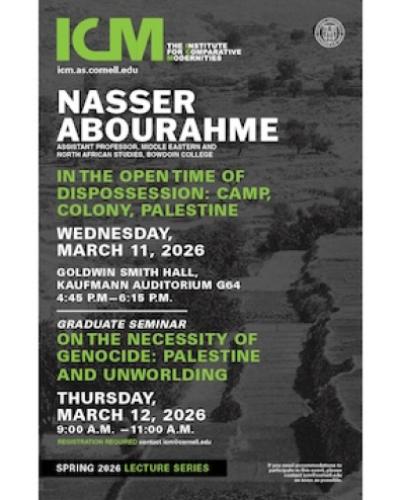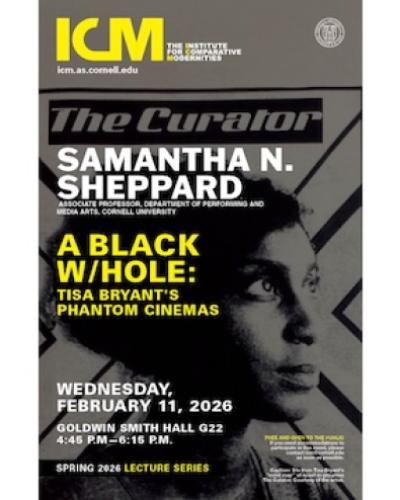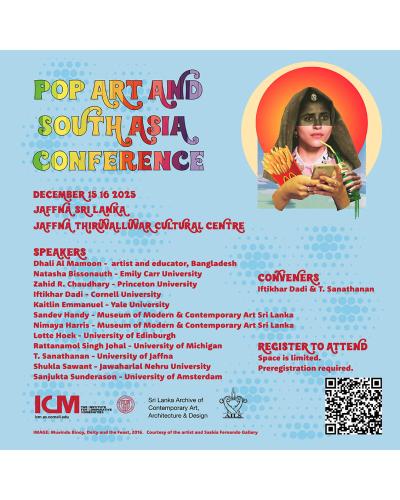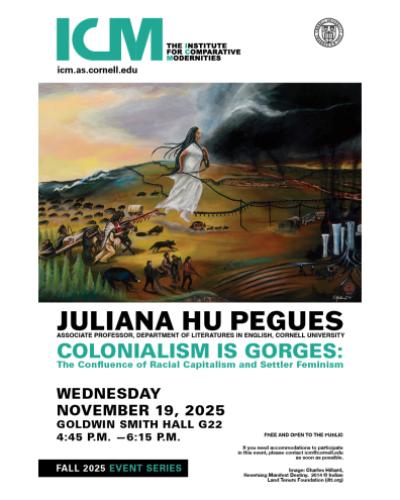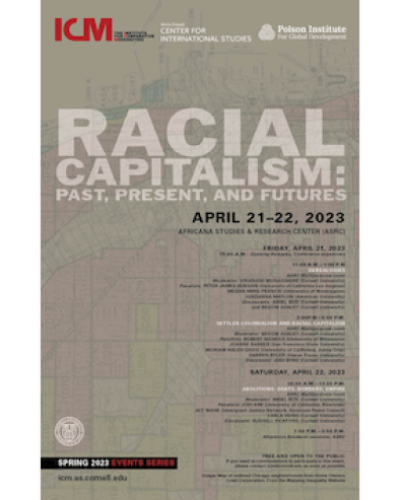ICM Spring 2023 Events Series
April 21–22, 2023, Africana Studies & Research Center
RACIAL CAPITALISM: PAST, PRESENT, AND FUTURES
This two-day conference, co-organized by the Einaudi Center for International Studies, the Institute for Comparative Modernities, and the Polson Institute for Global Development, brings together an interdisciplinary group of scholars conducting innovative research on the topic of racial capitalism across the globe. Anchored around political theorist Cedric Robinson’s two central claims—on the role of bonded labor in the development of capitalism and a world-consciousness rooted in African worlds—this conference is convened to spark conversation on the wider applicability of the term racial capitalism to understand current global articulations of capital and labor, and the emancipatory possibilities they may harbor.
Program
Day One: Friday, April 21, 2023 | Africana Studies & Research Center Multipurpose room
10:45 a.m. Opening Remarks, Conference organizers
11 a.m. — 1:00 p.m. Panel One | Genealogies
Moderator: Viranjini Munasinghe (Cornell University)
Panelists:
Peter James Hudson (University of California, Los Angeles)
Megan Ming Francis (University of Washington)
Jordanna Matlon (American University)
Discussants: Amiel Bize (Cornell University) and Begüm Adalet (Cornell University)
2:00 p.m. —4:00 p.m. Panel Two | Settler Colonialism and Racial Capitalism
Moderator: Begüm Adalet (Cornell University)
Robert Nichols (University of Minnesota)
Joanne Barker (San Francisco State University; The University of Chicago)
Muriam Haleh Davis (University of California, Santa Cruz)
Darren Byler (Simon Fraser University)
Discussant: Jodi Byrd (Cornell University)
4:00 p.m. Reception to follow afternoon panel | Hoyt Fuller Room
* * *
Day Two: Saturday, April 22, 2023 | Africana Studies & Research Center Multipurpose room
10:30 a.m. —12:30 p.m. Panel Three| Abolitions: Debts, Borders, Empire
Moderator: Amiel Bize (Cornell University)
Panelists:
Jodi Kim (University of California, Riverside)
Aly Wane (Immigrant Justice Network, Syracuse Peace Council)
Carla Hung (Cornell University)
Discussant: Russell Rickford (Cornell University)
1:00 p.m.—3:00 p.m. Afternoon Breakout sessions
Speaker Biographies
Peter James Hudson is a historian and Associate Professor of African American Studies and History at UCLA. His research interests are in the history of capitalism, white supremacy, and U.S. imperialism; the intellectual and political-economic history of the Caribbean and the Black world; and the history of Black radicalism and global anti-imperialism, and he writes about varying lineages of Racial Capitalism in the Boston Review. He is the author of Bankers and Empire: How Wall Street Colonized the Caribbean (U of Chicago P, 2017).
Megan Ming Francis is the G. Alan and Barbara Delsman Associate Professor of Political Science and an Associate Professor of Law, Societies, and Justice at the University of Washington. Francis specializes in the study of American politics, with broad interests in criminal punishment, Black political activism, philanthropy, and the post-civil war South. She is the author of the award winning book, Civil Rights and the Making of the Modern American State (Cambridge UP, 2014), and her commentary and research is featured in a number of academic and public outlets. She is a founding contributor to the Race and Capitalism project, a multi-institution collaboration that seeks to reinvigorate, strengthen and deepen scholarship on how processes of racialization within the U.S. shaped capitalist society and economy and how capitalism has simultaneously shaped processes of racialization.
Jordanna Matlon is an urban sociologist interested in questions of race and belonging in Africa and the African diaspora, and the ways “Blackness” operates as a signifier, intersects with gender norms, manifests in popular culture, and illuminates our understanding of political economy. Her book, A Man among Other Men: The Crisis of Black Masculinity in Racial Capitalism (Cornell UP, 2022) investigates the relationship between masculinity, work, and globalization in Abidjan, Côte d’Ivoire, and her earlier formulations about Racial Capitalism were published in other outlets including The Boston Review. She is Assistant Professor, School of International Service, American University, Washington D.C.
Robert Nichols is Associate Professor of Political Theory in the Department of Political Science at the University of Minnesota. His areas of research specialization include contemporary political theory (esp. Critical Theory); the history of political thought (especially pertaining to imperialism and colonialism in the 19th century); and the contemporary politics of settler colonialism and indigeneity in the Anglo-American world. His most recent book is Theft is Property! Dispossession and Critical Theory (Duke UP, 2020).
Joanne Barker is Lenape — a citizen of the Delaware Tribe of Indians. She is Professor of American Indian Studies at San Francisco State University, and Distinguished Visiting Professor in the Department of Race, Diaspora, and Indigeneity at The University of Chicago this academic year. She has authored Native Acts: Law, Recognition, and Cultural Authenticity (Duke UP, 2011) and Red Scare: State Discourses of the Indigenous Terrorist (U of California P, 2021). Barker serves on The Segorea Te Land Trust Board, an urban Indigenous women-led land trust based in the San Francisco Bay Area that facilitates the return of Indigenous land to Indigenous people.women-led land trust based in the San Francisco Bay Area that facilitates the return of Indigenous land to Indigenous people
Muriam Haleh Davis is Associate Professor in History at UC Santa Cruz. Her research interests focus on development, decolonization and race in North Africa. Her first book is Markets of Civilization: Islam and Racial Capitalism in Algeria (Duke UP, 2022). Davis is currently working on the history of the social sciences and decolonization, with a particular focus on the discipline of sociology.
Darren Byler is a sociocultural anthropologist and Assistant Professor in the School of International Studies, Simon Fraser University, Vancouver BC, whose teaching and research examines the dispossession of stateless populations through forms of contemporary capitalism and colonialism in China, Central Asia, and Southeast Asia. His monograph, Terror Capitalism: Uyghur Dispossession and Masculinity in a Chinese City (Duke UP, 2021), examines emerging forms of media, infrastructure, economics and politics in the Uyghur homeland in Chinese Central Asia (Ch: Xinjiang). Byler also writes a regular column for public outlets including SupChina, and his writing regularly appears in The Guardian, Noema Magazine, and ChinaFile.
Jodi Kim is Professor of Media and Cultural Studies at UC Riverside. Her teaching and research interests are at the intersections of Asian American studies, critical ethnic and race studies, postcolonial theory, feminist epistemologies, and critiques of US empire and militarism. She is the author of author of Ends of Empire: Asian American Critique and the Cold War (U of Minnesota P, 2010 ), and co-editor of the volume Critical Ethnic Studies: A Reader (Duke UP, 2016). Her most recent book is Settler Garrison: Debt Imperialism, Militarism, and Transpacific Imaginaries (Duke UP, 2022).
Carla Hung is a cultural anthropologist with research and teaching interests in the political economy of African migration to Europe and its thematic links to abolitionism in African diaspora studies. She is Assistant Professor of Anthropology at the University of North Carolina Asheville and a Fellow at Cornell’s Society for the Humanities. Her current book project Trafficking in Hospitality: Misgivings over Communal Care Amongst Eritrean Refugees in Italy investigates the criminalization of community networks used by Eritrean refugees to seek asylum and advocate for political reform at home. Her multi-sited ethnographic research was funded by the National Science Foundation and Wenner Gren. She teaches courses entitled Abolitionism Activism Social Justice; Critical Humanitarianism; Indigenous Economies; Law and Culture; and Migrants and Refugees in a Global Context.
Aly Wane is an undocumented human rights activist originally from Senegal. He has worked in the antiwar and global justice movements. His work currently focuses on the intersection of migrants' rights and racial justice issues. In the past he has worked with numerous groups including the American Friends Service Committee, the Workers' Center of CNY, Black Lives Matter Syracuse and the Alliance of Communities Transforming Syracuse. He has also been on the Steering Committee of the Black Immigration Network and was a policy consultant with the UndocuBlack Network. He is currently on the Steering Committee of the Syracuse Peace Council and on the Advisory Board of the immigrant Justice Network.
Begüm Adalet is a political theorist and Assistant Professor, Department of Government, Cornell with research and teaching interests in anti-colonial thought, U.S. empire, development, the Cold War, and the Middle East. She is the author of Hotels and Highways: The Construction of Modernization Theory in Cold War Turkey (Stanford UP, 2018), and various published or forthcoming articles about radical transnational thinkers like Frantz Fanon, James Baldwin, Lorraine Hansberry and others.
Amiel Bize is an economic anthropologist and Assistant Professor, Department of Anthropology, Cornell whose research focuses on social and economic transformations at capitalist margins. Her research interests include value and post-agrarian rural life, financialization and geographies of difference, postcolonial approaches to the economy, and the importance of leftovers. She has taught courses on racial capitalism, Marx and anthropology, gleaning, and the social life of money. Her writing appears in a variety of journals and public forums, including Cultural Anthropology, Planning Theory, and Etnofoor.
Jodi Byrd is Associate Professor in Cornell’s Department of Literatures in English. where their teaching and research focuses on Indigenous Studies, Indigenous and Queer Studies, and video game studies Byrd’s acclaimed book, The Transit of Empire: Indigenous Critiques of Colonialism (U of Minnesota P, 2011) examines how “Indianness” has been crucial to the formation of U.S. empire. Byrd recently co-edited the collection that informs many of the critical concerns of this conference, Colonial Racial Capitalism (Duke UP, 2022).
Viranjini Munasinghe is a historical anthropologist, Associate Professor, Department of Anthropology, and a founding member of the Institute for Comparative Modernities at Cornell. Her work is in the Caribbean (Trinidad) and the Asian Diaspora in the Americas. Her primary research and teaching interest is nationalism. She is the author of the book Callaloo or Tossed Salad?: East Indians and the Cultural Politics of Identity in Trinidad (Cornell UP, 2001). Her current research explores how nations are constituted through projects of comparison from the perspective of the Caribbean.
Russell Rickford is Associate Professor in the Department of History at Cornell. He specializes in African-American political culture after World War II, the Black Radical Tradition, and transnational social movements. He is the author of We Are an African People: Independent Education, Black Power, and the Radical Imagination (Oxford UP, 2016) and he recently co-edited the volume Ideas in Unexpected Places: Reimagining Black Intellectual History (Northwestern UP, 2022). His current project is a book about Guyana and African American radical politics in the 1970s. Rickford’s writing on activism appears in other outlets including Vox, TruthOut, and The Washington Post.

